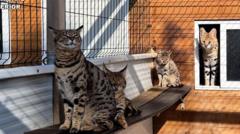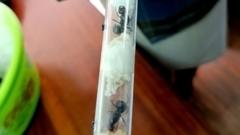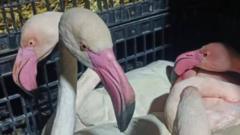Four men, including two Belgian teenagers, have pleaded guilty in a Kenyan court for attempting to smuggle thousands of live queen ants, valued at around $7,000, into Europe and Asia. The case, revealing an unusual type of wildlife trafficking, highlights ongoing issues in the illegal collection of lesser-known species that threatens biodiversity and local economies.
Four Men Plead Guilty in Attempted Smuggling of Thousands of Queen Ants

Four Men Plead Guilty in Attempted Smuggling of Thousands of Queen Ants
Two Belgian teenagers and two others are charged with trafficking live queen ants in Kenya, revealing a troubling trend in wildlife smuggling.
In a courtroom this week, four men faced serious charges after pleading guilty to attempting to smuggle thousands of live queen ants from Kenya. The defendants, David Lornoy and Seppe Lodewijckx, both 19-year-old Belgians, were apprehended at a guesthouse near Lake Naivasha while in possession of the insects, packed in specialized tubes for preservation.
The Kenya Wildlife Service reported that the captured ants, intended for the exotic pet market, were valued at approximately $7,000. Officials have noted an increasing trend in wildlife smuggling that extends beyond high-value animals, with traffickers now targeting lesser-known species, including insects. Recent incidents include the discovery of live beetles hidden in snack packs from Japan and coral being smuggled through U.S. ports.
The Kenya Wildlife Service condemned this practice, describing it as "biopiracy," which jeopardizes the nation's biodiversity and can limit the potential ecological and economic benefits to local communities and researchers. The Messor cephalotes species, which the defendants sought to sell, is notable for being the largest harvester ant globally and highly sought after by collectors who maintain colonies in artificial environments to study their complex behaviors.
In a parallel case, two additional suspects, Dennis N’gang’a from Kenya and Vietnam's Duh Hung Nguyen, were charged for illegally collecting and selling ants, possessing hundreds of live garden ants valued at around $1,500.
Following the arrest, the Kenya Wildlife Service exhibited photographs of the living space filled with test tubes and cotton swabs used for packaging. These tubes, designed to keep the ants alive for approximately two months, reflected the covert nature of this smuggling operation. During their court appearance, Lornoy and Lodewijckx expressed regret, claiming they collected the ants for fun. They are currently awaiting sentencing, as the case continues to unravel the intricacies of wildlife trafficking in the region.



















